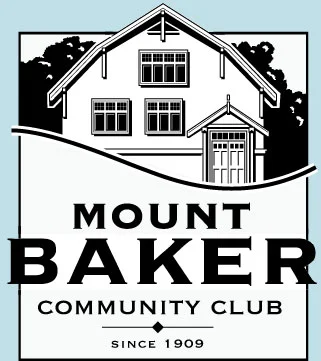Mount Baker did not emerge as a residential community until after 1905, when developer J. C. Hunter hired the Olmsted Brothers firm to design a park-like neighborhood of curving boulevards. Hunter set aside land for the Mount Baker Community Club, which has been a social and civic center for more than a century.
J.C. Hunter intended the new community to be one of Seattle's finest. He therefore set aside land for a community club, which would belong to Mount Baker property owners. That club house, organized in 1909, and today known as the Mount Baker Community Club, is said to be "the oldest continuously active community club in the United States."
The club's mandate was to act as a quasi-independent city hall. It looked after lighting, police protection, and neighborhood beautification, and it sponsored social events. According to early tradition, no discussion of religious or political subjects was permitted. (Politics, however, would consume club agendas beginning in the 1960s.) The handsome club building has undergone several phases of remodeling and continues to be a social and civic center of the community. In earlier years, male members roamed the neighborhood on a "New Year's Calling." A Rose Show was featured, and the Mount Baker tour of homes has been, with an interruption or two, a major annual event.
During the 1960's and 1970's, the Clubhouse became an open forum in which neighborhood and city issues were discussed. Political candidates were welcomed; positions were taken in opposition to the Mount Baker "cut" (a proposal to virtually remove Mount Baker Ridge to accommodate a second Lake Washington bridge access); and in opposition to "red-lining" (banks and realtors redline when they designate residents of specific areas and neighborhoods as ineligible for home loans - it is a form of racial and economic discrimination).
Members of the community found themselves addressing the Seattle City Council and that neighborhood activism encouraged a number of Mount Baker residents to stand for local elective office. Including, Norm Rice (b. 1943), who became a city council member and, in 1989, Seattle's first African American mayor.



